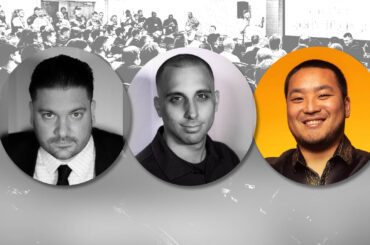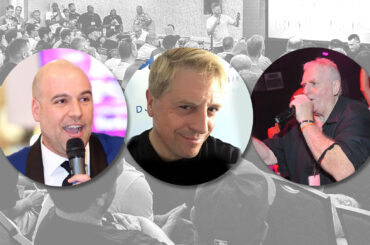As it often happens with global DJ/producers, Greg Axelrad is living a bi-continental life.
Better known to drum-n-bass fans as Submorphics, Axelrad has returned to his Stateside home after spending a good chunk of his time this past year in Europe. He has an eye on transplanting himself to Amsterdam, but for now he calls San Francisco home.
A specialist in the liquid side of the genre, Axelrad has had releases on all the high-profile labels featuring that funky sound: Hospital, Sgn:Ltd, Liquid V, Good Looking, Innerground, and Spearhead. His latest, the 10-track Detroit Haze EP, is on The North Quarter, which is run by Lenzman, the Dutch master of soulful d-n-b… hence, the draw to The Netherlands.
As a North America-based artist Axelrad, who spent his formative years in Chicago and Detroit, is a drum-n-bass unicorn with a career on par with any of his Europe-based contemporaries. This includes bookings at all the major events and club nights that feature the sound on that side of the world. He is quick to point out, however, that it took a long time for him to reach this point.
“I’ve been at this for over 10 years,” he says. “Coming from America, everything takes longer to develop. Building relationships over the internet stunts the growth of your career. Maybe if I’d been in Europe the whole time, constantly collaborating and networking and making lot more moves, it would have been a different story.
“We don’t have the drum-n-bass culture here. But at the same time, I think it’s been helpful for the development of my music to be isolated out here. I can come at it from my own angle because I’m not getting the same influences.”
The multi-genre Detroit Haze EP is a reflection of Axelrad’s influences, particularly Detroit hip hop and Chicago house. The EP is underscored by his fine liquid touch, but Axelrad also explores a wide range of moods that includes the fresh hip hop of “Hot Ish” (featuring the mic stylings of Michigan MC SelfSays), the silky R&B vibes of “Weather It Out” (with the inimitable flow of liquid drum-n-bass icon, Steo), and the soul-pop-flavored “Don’t Be So Cold.”
A proficient piano and guitar player, Axelrad’s a believer in the simple studio set-up. He has an iMac running Avid’s Logic X and Propellerhead’s Reason 8, a Universal Audio interface that allows him to utilize plug-ins, Discovery Pro VST, Predator, and reliable Native Instruments standbys Massive and FM7. Axelrad works a great deal with built-in plug-ins from Logic and Reason.
The only samples you’ll hear in his music are vocals from the ’60s or ’70s, but synths (played by him) are his sound sources. Drum-n-bass tech wizard Ulterior Motive is tasked with all the mixes so Axelrad can focus on the creative rather than the analytical.
“Lenzman helped a lot in getting the product to a more polished place,” Alexrad says of Detroit Haze. “At first, it was little weird for him to suggest so many different things, all these little details. Eventually, I found it refreshing that somebody wanted to be so hands-on with my music. It was about letting go, taking feedback and putting my ego to the side and doing what’s best for the project. The end result was a little bit different from my previous work, but it was also liberating to not be a control freak. It’s a credit to Lenzman that he’s so particular about the final product.”
When DJing, Alexrad like to present his liquid d-n-b in the smoothest manner. Accordingly, his USB folders are organized by key, with one “key-less” folder from which he selects tunes to bridge between the songs in the other folders. Of course, he also has an “oldies-but-goodies” folder.
“I try to play a social, deep, both uplifting and melancholic, musically interesting set,” he says. “But sometimes, you just have to strip back and play to what’s in front of you. It’s a hard one because you want to adapt to the situation and to the crowd, but you don’t completely want to water yourself down to the point of not representing yourself. It’s a balance. I don’t play absolutely balls-to-the-wall hard, but I do play some slightly harder stuff that’s heavy and minimal in order to connect the dots. But then, I try to keep a diverse set and play some half-time, hip-hop-type stuff to switch it up.
“I don’t have a million tunes,” he continues, “just 100 to 200 at any given point in time. I try and never repeat the same set, even though no one, but me knows. I do end up playing a lot of the same mixes from show to show, but you’ve got to keep it fresh, otherwise you’re going to bore yourself – and if you’re boring yourself, people pick up on that energy.”







